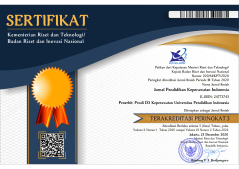Perawatan Diri Pada Pasien Gagal Jantung
Abstract
ABSTRAK
Gagal jantung merupakan salah satu penyakit kardiovaskuler yang paling sering terjadi di seluruh dunia yang mengakibatkan tingginya angka mortalitas, morbiditas dan juga berdampak secara finansial terutama bagi lanjut usia. Rehospitalisasi merupakan masalah umum yang sering terjadi pada pasien gagal jantung yang sebagain besar disebabkan oleh keterlambatan dalam pengenalan gejala, pengobatan dan ketidakpatuhan diet serta kurangnya pengetahuan dan keterampilan dalam melakukan perawatan diri. Panduan penanganan gagal jantung menekankan pentingnya perilaku perawatan diri untuk menurunkan kekambuhan dan rehospitalisasi pada pasien gagal jantung. Penelitian ini bertujuan untuk menggambarkan perilaku perawatan diri pada pasien gagal jantung yang mengunjungi poliklinik jantung di RSUD Panembahan Senopati Bantul. Penelitian ini merupakan penelitian deskriptif quantitatif dengan menggunakan pendekatan cross sectional. Sampel berjumlah 74 responden yang merupakan pasien rawat jalan di poliklinik jantung pada bulan Juni hingga Juli 2018. Alat ukur yang digunakan adalah Self-Care of Heart Failure Index (SCHFI), (skor ≥70 poin=adekuat). Uji statistik chi-square digunakan untuk mengetahui hubungan antara factor sosiodemografi dengan perilaku perawatan diri pada pasien gagal jantung. Hasil penelitian ini menunjukkan bahwa perilaku perawatan diri pada sebagian besar responden masih belum adekuat dengan frekuensi perilaku perawatan diri adekuat yang masih rendah (pemeliharaan: 45±13.1 (7.7%), pengelolaan: 46±20.4 (13.0%) dan kepercayaan: 69±16.5 (38.5%)). Hanya satu faktor yaitu penyakit penyerta yang berhubungan dengan perilaku perawatan diri pada pasien gagal jantung pada dimensi kepercayaan diri. Hasil penelitian ini menunjukkan bahwa sebagian besar responden memiliki perilaku perawatan diri yang tidak adekuat seperti juga pada negara-negara lainnya sehingga diperlukan upaya untuk meningkatkan perilaku perawatan diri pada pasien gagal jantung.
ABSTRACT
Heart failure (HF) is one of the most prevalent cardiovascular diseases in the world which associated with significant mortality, morbidity, and huge financial burden, particularly among aging population. Rehospitalization remain a concern in the care of the heart failure patient which largerly associated with delay in symptoms recognition, treatment, diet non-compliance and also lack of knowledge and skills in heart failure self-care. Guideline on HF emphasize the important of self care in preventing symptoms and hospital readmission. This study aims to describe self-care behavior in a sample of heart failure patients. This is a descriptive cross-sectional study with non-probabilistic sample of 74 in an out-patient heart clinic from June-July 2018. Self-care was measured using the Self-Care of Heart Failure Index (SCHFI), (scores ≥70 points=adequate self-care). Chi-square test was conducted to test whether participant’s characteristics associated with self-care behavior among heart failure patients in three scales. The result shows that self-care was inadequate in most scales (self-care maintenance: 43.4±11.8, self-care management: 49.4±18.5 and self-care confidence: 68,6±14.5. Low frequencies of participants with adequate self-care also observed in the study (self-care maintenance: 5.4%, self-care management: 15.4%) and self-care confidence: 36.5%)). In self-care confidence subscale, higher scores of the SCHFI were associated with no comorbid conditions (p=0.01). None of the sociodemographic and clinical characteristics of the sample were associated with increased self-care in other 2 sub-scales. In conclusion, study shows that self-care in HF is inadequate, interventions aimed at improving self-care espescially in self-care maintenance sub-scale are greatly needed. Additional studies are needed to determine the best approach for this.
Keywords
Full Text:
PDFReferences
Albert, N., Trochelman, K., Li, J., & Lin, S. (2010). Signs and symptoms of heart failure: Are you asking the right questions? American Journal of Critical Care, 19(5), 443–452. https://doi.org/10.4037/ajcc2009314
Annema, C., Luttik, M. L., & Jaarsma, T. (2009). Reasons for readmission in heart failure: Perspectives of patients, caregivers, cardiologists, and heart failure nurses. Heart and Lung: Journal of Acute and Critical Care, 38(5), 427–434. https://doi.org/10.1016/j.hrtlng.2008.12.002
Barnason, S., Zimmerman, L., & Young, L. (2012). An integrative review of interventions promoting self-care of patients with heart failure. Journal of Clinical Nursing, 21(3–4), 448–475. https://doi.org/10.1111/j.1365-2702.2011.03907.x
Basuray, A., Dolansky, M., Josephson, R., Sattar, A., Grady, E. M., Vehovec, A., … Hughes, J. W. (2015). Dietary sodium adherence is poor in chronic heart failure patients. Journal of Cardiac Failure, 21(4), 323–329. https://doi.org/10.1016/j.cardfail.2014.12.016.DIETARY
Conceição, A. P. da, Santos, M. A. dos, Santos, B. dos, & Cruz, D. de A. L. M. da. (2015). Self-care in heart failure patients. Revista Latino-Americana de Enfermagem, 23(4), 578–586. https://doi.org/10.1590/0104-1169.0288.2591
Dickson, V. V., Buck, H., & Riegel, B. (2013). Multiple Comorbid Conditions Challenge Heart Failure Self-Care by Decreasing Self-Efficacy. Nursing Research, 62(1), 2–9. https://doi.org/10.1038/nrcardio.2011.95
Jovicic, A., Holroyd-Leduc, J. M., & Straus, S. E. (2006). Effects of self-management intervention on health outcomes of patients with heart failure: A systematic review of randomized controlled trials. BMC Cardiovascular Disorders, 6, 1–8. https://doi.org/10.1186/1471-2261-6-43
Kaawoan, A. Y. A. (2012). Hubungan Self Care dan Depresi dengan Kualitas Hidup Pasien Heart Failure di RSUP DR RD Kandou Manado. Universitas Indonesia.
Kato, N., Kinugawa, K., Ito, N., Yao, A., Watanabe, M., Imai, Y., … Kazuma, K. (2009). Adherence to self-care behavior and factors related to this behavior among patients with heart failure in Japan. Heart and Lung: Journal of Acute and Critical Care, 38(5), 398–409. https://doi.org/10.1016/j.hrtlng.2008.11.002
Kemenkes RI. (2014). Info Datin Pusat Data Dan Informasi Kementrian Kesehatan RI. Kemenkes Ri, 109(1), 1–8. https://doi.org/10.1017/CBO9781107415324.004
Lam, C. S. P. (2015). Heart failure in Southeast Asia: facts and numbers. ESC Heart Failure, 2(2), 46–49. https://doi.org/10.1002/ehf2.12036
Oosterom-Calo, R., Ballegooijen, A. J. Van, Terwee, C. B., Brouwer, I. A., Jaarsma, T., & Brug, J. (2012). Determinants of heart failure self-care : a systematic literature review. Heart Failure Reviews, 17, 367–385. https://doi.org/10.1007/s10741-011-9292-9
Riegel, B., Dickson, V. V., & Vaulkner, K. M. (2015). The Situation-Specific Theory of Heart The Situation-Specific Theory of Heart Failure Self-Care Revised and Updated. Journal of Cardiovascular Nursing, 00(May 2016), 00–00. https://doi.org/10.1097/JCN.0000000000000244
Riegel, B., Driscoll, A., Suwanno, J., Moser, D., Lennie, T. A., Chung, M. L., … Cameron, J. (2009). Heart Failure Self-care in Developed and Developing Countries. Journal of Cardiac Failure, 15(6), 508–516. https://doi.org/10.1016/j.cardfail.2009.01.009.Heart
Riegel, B., Lee, C. S., Dickson, V. V., & Carlson, B. (2009). An update on the self-care of heart failure index. Journal of Cardiovascular Nursing, 24(6), 485–497. https://doi.org/10.1097/JCN.0b013e3181b4baa0
Riegel, B., Moser, D. K., Anker, S. D., Appel, L. J., Dunbar, S. B., Grady, K. L., … Whellan, D. J. (2009). State of the science: Promoting self-care in persons with heart failure: A scientific statement from the american heart association. Circulation, 120(12), 1141–1163. https://doi.org/10.1161/CIRCULATIONAHA.109.192628
Roger, V. L. (2013). Epidemiology of heart failure. Circ Res, 113(6), 646–659. https://doi.org/10.1161/CIRCRESAHA.113.300268
Shao, J. H., Chang, A. M., Edwards, H., Shyu, Y. I. L., & Chen, S. H. (2013). A randomized controlled trial of self-management programme improves health-related outcomes of older people with heart failure. Journal of Advanced Nursing, 69(11), 2458–2469. https://doi.org/10.1111/jan.12121
Siswanto, B. B., Radi, B., Kalim, H., Santoso, A., Suryawan, R., Erwinanto, … Santoso, T. (2010). Heart Failure in NCVC Jakarta and 5 hospitals in Indonesia. CVD Prevention and Control, 5(1), 35–38. https://doi.org/10.1016/j.cvdpc.2010.03.005
Tung, H. H., Lin, C. Y., Chen, K. Y., Chang, C. J., Lin, Y. P., & Chou, C. H. (2013). Self-management intervention to improve self-care and quality of life in heart failure patients. Congestive Heart Failure, 19(4), 9–16. https://doi.org/10.1111/chf.12014
Wahyuni, A., & Kurnia, O. S. (2014). Hubungan Self Care dan Motivasi dengan Kualitas Hidup Pasien Gagal Jantung. Jurnal Keperawatan Padjadjaran, 2(2). https://doi.org/10.24198/jkp.v2n2.5
Yancy, C. W., Jessup, M., Bozkurt, B., Butler, J., Casey, D. E., Drazner, M. H., … Wilkoff, B. L. (2013). 2013 ACCF/AHA guideline for the management of heart failure: A report of the american college of cardiology foundation/american heart association task force on practice guidelines. Circulation, 128(16). https://doi.org/10.1161/CIR.0b013e31829e8776
DOI: https://doi.org/10.17509/jpki.v4i2.13443
Refbacks
- There are currently no refbacks.
Jurnal Pendidikan Keperawatan Indonesia(JPKI) published by Indonesia University of Education. JPKI is licensed under a Creative Commons Attribution-ShareAlike 4.0 International License.
Statcounter
Office :
Nursing Department. FPOK UPI.
229, Dr. Setiabudhi Street. Bandung 40154
West Java , Indonesia
E-mail : jpki@upi.edu

_.png)
_.png)
_.png)











